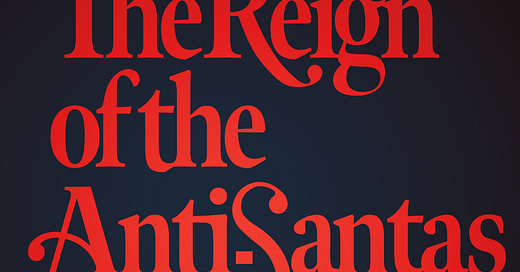(An excerpt from The Reign of the Anti-Santas. Read below, or listen to this chapter from the audiobook, as interpreted by David Foley Jr.)
Under the cathedral ceilings of our great room in Dana Point, we had a giant white polyvinyl tree for the alternating Christmases when my wife’s children jetted in. The other years, we mostly left Christmas alone. Southern California had a way of making you laugh at history, at tradition, at any notion that the past could matter.
But even in that least wintry land, you could feel the approach of Christmas. Time still sped up to a sudden stop. The hairy hedonists said it didn’t happen at all. But that was part of the pageant for humans. When they didn’t receive what they had deeply wanted, they’d put in real effort to pretend that they’d actually received it, or something better. It worked with gifts or love of the promise of life making sense. They faked it so as not to let down the one who had let them down. Once you saw the disappointed child, you saw little else. Once you saw it, you were on Santa’s side forever. No stack of gifts was too high or too expensive to protect curious, honest children from becoming mindless, starving zombie adults.
But I thought I was past all that. In those days, in that California, I might have been.
There was one Christmas Eve, however. My stepkids were at their dad’s, and my wife was at her sister’s in Minnesota. When the holiday shut everything down, I was bidding on a McClaren dealership in Malibu, and I felt like staying close to the heathens in Los Angeles. I found myself in a charming little bar in Santa Monica, with its one humble TV tuned to Midnight Mass at St. Patrick’s Cathedral in New York.
The incredible fabrics of the bishop and altar boys strained through the technicolor pixels. But I saw something. I saw how tired they were. I saw how difficult it was to keep doing the ceremony. I saw the exhausted and unsexy people—no matter if they were among the most prominent humans in the biggest city of the most powerful nation the world had ever known—on the hardwood pews. I saw the fathoms-deep shadow that animated Christmas. And suddenly, I could see that shadow, not just in the slow and deliberate recitations onscreen, but in the fir trees blocking the sunlight from my newly renovated kitchen, their needles nearly brushing the plate glass in a gale.
I saw some of it clearly then: Christmas is failure. By the time it rolls in, the sun is ready to throw in the towel. Failure is real and constant. It’s the late afternoon feeling like swallowing sea water. It’s waking to reluctantly conduct some nasty act of self-care or else die. Even the story intoned by the bishop was a story of failure: More than a quarter million years of physically modern humans had failed miserably. And in their misery, they required drastic redemption from the vise-like consequences of their best efforts. And that redemption could only come from an obscure child born fucked into the bitter cold of a disreputable corner of an inhospitable world.
But from that tiny creature in that forgettable corner comes a burst of boundless hope. It felt right. It rhymed well with something I couldn’t place at the bar that night, though I recognized it later. That unlikely burst almost never happens on schedule and certainly never when you think you need it. Ask anyone in the Christmas business.
In the bar, I broke out in laughter—first at that year’s wild overstock of gigantic red bows. I had tears in my eyes. It was Christmas Eve in Los Angeles, and the bar was far from empty. A breeze blew in from the ocean through the open door. It was the kind of bar and the kind of year where no one looked twice at a cackling midget. It was an incredibly meaningful moment that I forgot about the next day—a common phenomenon in LA.
In the car business, we give out awards. They’re meaningless and expensive, but you have to give them out to the salesmen and women. And you have to show up to receive them, if only for the morale of the showroom. I was digging around for the box where we kept those Lucite pyramids and maple plaques, fumbling through an empty office at a Porsche dealership when my foot snagged an oversized bow. It was old, crumpled, unusable. The whole point of the bow was to be new, clean, and springy—to underscore the car's newness. The sales guy would say, “Great! We even have a bow for it—at least I think we have one left” in that half-second before the buyer could quibble about the sticker price. The bows were worth their weight in plutonium.
Anyway, I tripped over the fucking thing and fell into a box of tax binders. Untangling it from my loafer, I suddenly returned to that night at Chez Jay in Santa Monica, and the last time tears had come to my eyes. It made me think of Christmas. I called Jackie.
“Okay, I’ll do it. I’ll meet the old man.”



